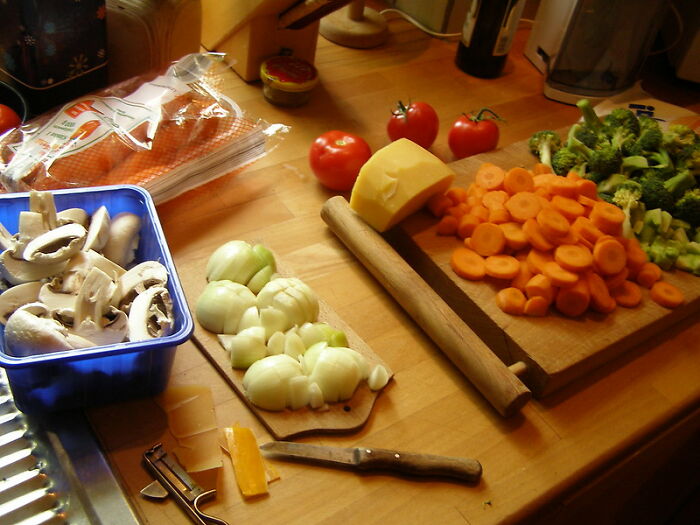
Culinary Grads Share 20 Useful Tips They Didn’t Learn In School
Imagine a situation: you’re boiling something in a pot and trying to fry something in the pan at the same time when suddenly you smell the burning potatoes you forgot in the oven. Merely the thought of this is enough to cause flashbacks for anyone who’s ever tried to cook something more complicated than a hot dog or a microwave dinner. And even though cooking can be incredibly frustrating at times, there are few little things you can learn to make the whole thing a breeze.
A little while ago, Reddit user u/YoungChefBoy asked people to share some cooking tips they didn’t learn in culinary school and quickly received hundreds of genius answers – check out some of the best ones in the gallery below!
#1

Image source: TwoForSlashing
Not a food tip but a cooking tip…. a falling knife has no handle. If you drop a knife, get the hell out of the way and let it hit the floor. Washing it is easy enough. Try to catch it and you could be visiting the emergency room.
#2
Professional chef here. Hot pans make a world of difference. Never start anything in a cold pan.
Image source: Illogical_Arguments
#3

Image source: CrowEyedWolf
Recipes are a road map. You don’t have to follow them exactly, its ok to deviate. Unless you are baking, in which case, follow the recipe exactly.
#4
Take a small hand towel and either loop it through a belt loop or between your waist and your belt so it hangs over your leg. As you move around, then, you always have something to wipe your hands/your instruments on and you don’t need to go out of your way to do it!
Image source: -Pianoteeth
#5

Image source: DarlingDrak3
If you’re a home cook always clean up after your self while you’re cooking. You’ll thank yourself after you’ve eaten and you’re full and you don’t have a sink full of dishes and stuff to put away everywhere.
#6
ALWAYS use real butter, not margarine.
Image source: Earthicus
#7

Image source: Buddingastronomer
You can use the stem of broccoli. Just peel, slice and fry it in the pan, it’s delicious.
#8
The only recipe that should have only one clove of garlic in it is a recipe for one clove of garlic. Two MINIMUM people.
Image source: Bigolekern
#9

Image source: gkevinkramer
Learn cooking techniques instead of recipes.
Don’t approach recipes like they’re magic spells in the Harry Potter universe. If you wiggle your nose wrong or put in a spec to much of some seasoning you’re not going to end up with a completely different dish.
Alton Brown does an incredible job of teaching a cooking technique and then showing you a recipe that applies that technique. If you learn a process instead of a rote recipe you will know how to cook dozens of dishes, and it’s really the only way to develop skills in the kitchen.
#10

Image source: Azuenz
Electric stoves are much hotter than gas. A high setting on gas will get you a nice sear, but the same on electric will burn. It’s not something to worry about in the kitchen, but definitely at home.
#11
When making a sauce for your pasta, you should add some of the water you used to boil the pasta into the sauce. This will help the sauce bind better to the pasta and make it taste better.
Image source: captain_curryman
#12

Image source: theoakking
Pay attention to all your senses. Sauteing things like onions sound different at different stages. More of a hiss at the start as the steam escapes settling down to a crackle once all that’s left its vegetable and fat. Similarly everything you cook will have subtle changes to the way they smell as they cook. There have been many times when I have been multitasking and my nose has alerted me to check on whatever I have in the oven. I’m not talking about smelling burning but just the subtle changes as certain stages of cooking are reached. Eventually it becomes second nature.
#13
Add about a half of a tablespoon of sugar to your chili or spaghetti sauce. It takes some of the acidity out.
Image source: Phnxfrhwk
#14

Image source: Aine8
You can use soy sauce or fish sauce as a substitute for salt for a better umami taste. Also, because you’ll need less due to the concentrated flavour, it’ll naturally be less sodium.
#15
Extra Virgin Olive Oil is not for frying things! It has a very low smoke point and will break down. For higher (but still not very high) heat, you want regular Olive Oil, not Extra Virgin.
Image source: CA1900
#16

Image source: Importchef
Salt in the hand, not in the pan. When adding salt to a dish, try not to hang a 5 pound box over it.
#17
Always scrape the ingredients from the cutting board into a pot with the back of the knife, it will help the blade stay sharp longer
Image source: bookmole86
#18

Image source: labretirementhome
Salt early, salt late. Adding salt at different points in cooking dramatically affects results.
#19
Mise en place. Have all your stuff lined up and ready to go before you start. You don’t want something to burn because you’re busy looking for the tablespoon or opening a can of something.
Image source: Tacocatx2
#20

Image source: Aszshana
Using scissors to cut things. Cherry tomatoes, dough, pizza, some cuts of meat, veggies…. So much faster, less to clean up and way cleaner cuts.












Got wisdom to pour?